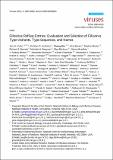Filovirus RefSeq Entries: Evaluation and Selection of Filovirus Type Variants, Type Sequences, and Names

View/
Author
Kuhn, Jens H.
Bào, Yīmíng
Bavari, Sina
Becker, Stephan
Bennett, Richard S.
Bergman, Nicholas H.
Blinkova, Olga
Bradfute, Steven
Brister, J. Rodney
Bukreyev, Alexander
Chandran, Kartik
Chepurnov, Alexander A.
Davey, Robert A.
Dietzgen, Ralf G.
Doggett, Norman A.
Dolnik, Olga
Dye, John M.
Enterlein, Sven
Fenimore, Paul W.
Formenty, Pierre
Freiberg, Alexander N.
Garry, Robert F.
Garza, Nicole L.
Gire, Stephen K.
Gonzalez, Jean-Paul
Griffiths, Anthony
Happi, Christian T.
Hensley, Lisa E.
Herbert, Andrew S.
Hevey, Michael C.
Hoenen, Thomas
Honko, Anna N.
Ignatyev, Georgy M.
Jahrling, Peter B.
Johnson, Joshua C.
Johnson, Karl M.
Kindrachuk, Jason
Klenk, Hans-Dieter
Kobinger, Gary
Kochel, Tadeusz J.
Lackemeyer, Matthew G.
Lackner, Daniel F.
Leroy, Eric M.
Lever, Mark S.
Mühlberger, Elke
Netesov, Sergey V.
Olinger, Gene G.
Omilabu, Sunday A.
Palacios, Gustavo
Panchal, Rekha G.
Park, Daniel J.
Patterson, Jean L.
Paweska, Janusz T.
Peters, Clarence J.
Pettitt, James
Pitt, Louise
Radoshitzky, Sheli R.
Ryabchikova, Elena I.
Saphire, Erica Ollmann
Sealfon, Rachel
Shestopalov, Aleksandr M.
Smither, Sophie J.
Sullivan, Nancy J.
Swanepoel, Robert
Takada, Ayato
Towner, Jonathan S.
van der Groen, Guido
Volchkov, Viktor E.
Volchkova, Valentina A.
Wahl-Jensen, Victoria
Warren, Travis K.
Warfield, Kelly L.
Weidmann, Manfred
Nichol, Stuart T.
Note: Order does not necessarily reflect citation order of authors.
Published Version
https://doi.org/10.3390/v6093663Metadata
Show full item recordCitation
Kuhn, J. H., K. G. Andersen, Y. Bào, S. Bavari, S. Becker, R. S. Bennett, N. H. Bergman, et al. 2014. “Filovirus RefSeq Entries: Evaluation and Selection of Filovirus Type Variants, Type Sequences, and Names.” Viruses 6 (9): 3663-3682. doi:10.3390/v6093663. http://dx.doi.org/10.3390/v6093663.Abstract
Sequence determination of complete or coding-complete genomes of viruses is becoming common practice for supporting the work of epidemiologists, ecologists, virologists, and taxonomists. Sequencing duration and costs are rapidly decreasing, sequencing hardware is under modification for use by non-experts, and software is constantly being improved to simplify sequence data management and analysis. Thus, analysis of virus disease outbreaks on the molecular level is now feasible, including characterization of the evolution of individual virus populations in single patients over time. The increasing accumulation of sequencing data creates a management problem for the curators of commonly used sequence databases and an entry retrieval problem for end users. Therefore, utilizing the data to their fullest potential will require setting nomenclature and annotation standards for virus isolates and associated genomic sequences. The National Center for Biotechnology Information’s (NCBI’s) RefSeq is a non-redundant, curated database for reference (or type) nucleotide sequence records that supplies source data to numerous other databases. Building on recently proposed templates for filovirus variant naming [<virus name> (<strain>)/<isolation host-suffix>/<country of sampling>/<year of sampling>/<genetic variant designation>-<isolate designation>], we report consensus decisions from a majority of past and currently active filovirus experts on the eight filovirus type variants and isolates to be represented in RefSeq, their final designations, and their associated sequences.Other Sources
http://www.ncbi.nlm.nih.gov/pmc/articles/PMC4189044/pdf/Terms of Use
This article is made available under the terms and conditions applicable to Other Posted Material, as set forth at http://nrs.harvard.edu/urn-3:HUL.InstRepos:dash.current.terms-of-use#LAACitable link to this page
http://nrs.harvard.edu/urn-3:HUL.InstRepos:13347410
Collections
- FAS Scholarly Articles [18292]
- SPH Scholarly Articles [6362]
Contact administrator regarding this item (to report mistakes or request changes)


